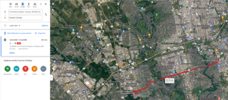Bojaxs
Active Member
I guess I was expecting a quicker trip than 33-34 minutes. This project cost roughly 2.5 billion dollars. Couldn't we have achieved a 33-34 minute trip length at a much cheaper cost by construct a York region style BRT along Finch?average speed is calculated by using the total distance of the line and the time it takes to get there. This includes the time decelerating, dwell times at stops and time accelerating. For context most bus routes have an average speed somewhere around 15-17 km/h the 29 Dufferin has an average speed during peak times of as low as 10.6 km/h. Line 6 once operating is likely going to be quite consistent with its average speed and is unlikely go much lower than that 20 km/h average
I'm looking at google maps right now (midnight) and it's telling me the 36B will go from Finch West to Humber College within 39 minutes. Roads being empty at midnight would be similar to dedicated bus lanes with fewer stops, no?





